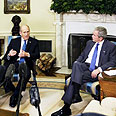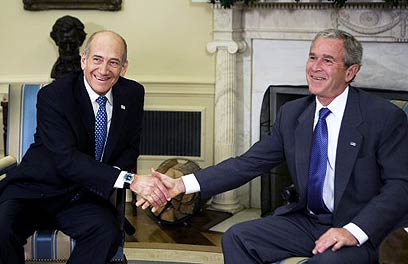
Bush says hopes to strengthen Abbas
US President Bush tells PM Olmert during White House meeting his administration is looking to bolster Palestinian president, new government against Hamas; says all options on the table in dealing with Iranian nuclear threat
“Our hope is that President Abbas and Prime Minister Fayyad will be strengthened to the point where they can lead the Palestinians in a different direction,” Bush said at the start of a meeting with Israeli Prime Minister Ehud Olmert.
Western powers have rallied behind Abbas with promises of renewed aid, hoping to contain damage from Hamas’ violent takeover of the Gaza Strip last week and parlay it into revived peace moves between Palestinian moderates and Israel.
“We share a common vision of two states living side by side in peace,” Bush said, promoting what he called a “common strategy to fight off” extremists in Gaza.
Olmert has said he was open to conciliatory moves toward Abbas, who dismissed the Hamas-led government and formed an emergency cabinet of Fatah loyalists in the West Bank as a counterweight to the Islamists’ control of Gaza.
The United States and European Union pledged on Monday to lift an economic and diplomatic embargo imposed on the Palestinians after Hamas won elections last year and rejected their calls to recognize Israel and renounce violence.

Olmert (L) and Bush (photo: AFP)
Washington, Israel and the EU regard Hamas as a terrorist group. Fatah backs a negotiated peace with the Jewish state. Abbas wants Bush to urge Israel, Washington’s close ally, to begin peace talks as soon as possible to show his people he can make progress toward their dream of statehood.
'There's a price to be paid'
The Bush administration has signaled it sees a “West Bank first” policy—doing its utmost to bolster Abbas and to nurture Israeli contacts with him—as the best way to salvage something from Hamas’ military victory in Gaza.
Bush reiterated that all options were on the table in dealing with Iran's nuclear challenge.
Asked during his meeting with Olmert if military action remained an option for dealing with Iran, Bush said, "My position has not changed. All options are on the table. I would hope that we could solve this diplomatically," he replied.
Bush said it was important that Iran faced "consequences" such as sanctions and other economic measures for defying the international community over its nuclear program.
"There's a price to be paid," he said.
The United States accuses Iran of seeking to build atomic bombs, a charge Tehran denies.
Turning his attention to Syria, the American president said Israel does not need his approval to launch negotiations with Damascus.
Olmert, for his part, said conditions for negotiations with Syria are not right yet.
Ronny Sofer contributed to the report










